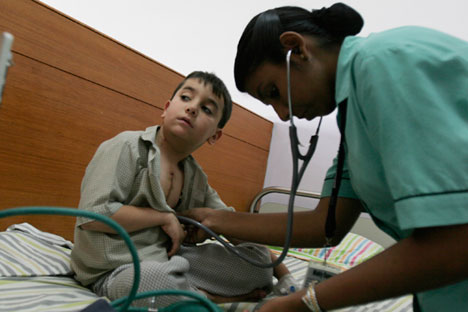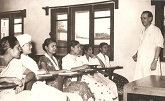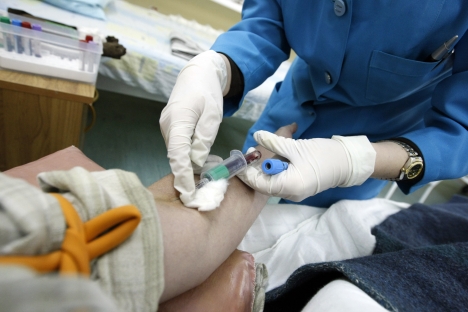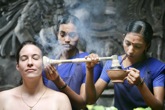India emerges as new destination for Russian medical tourists

India attracts patients because of the very high level of healthcare infrastructure, skilled medical personnel and lower prices compared to other medical tourism destinations. Source: AP
Asian countries are seriously challenging Europe, US and Israel as attractive destinations for medical tourists: people who travel across international borders to obtain healthcare.
India, Thailand and Singapore are three countries in Asia that receive the maximum number of medical tourists, because of the quality of healthcare infrastructure and the availability of highly skilled doctors, as well as lower cost of treatment.
India hosts thousands of medical tourists from the US, Canada, Australia and UK, as well as from African countries and Asian neighbours, like Bangladesh, Sri Lanka and China yearly. According to ASSOCHAM, in 2011 India saw 850,000 medical tourists and by the end of this year this number may rise to 3.2 million.
Indian medical tourism market is expected to expand at a CAGR of 27 per cent to reach US$3.9 billion in 2014, from US$1.9 billion in 2011, according to the “Medical Value Travel in India” report by KPMG and FICCI. Globally the medical travel industry is estimated at US$ 10.5 billion and is expected to grow to US$ 32.5 billion over the next five years at CAGR of 17.9 per cent.
Multiple factors
Despite Russia being known in India particularly for the quality of its medical education – consider that eight out of ten Indian students in Russia are enrolled in medicine or dentistry courses – there are multiple factors that make Russian patients seek better healthcare options abroad, and more recently, in India too.
The Indian healthcare sector amounted to US$ 78.6 billion in 2012 and is expected to reach approximately $158.2 billion by 2017, according to KPMG. The Russian healthcare sector in the same period, according to PWC, stood at US$86 billion. The difference between the two countries is that while in India the healthcare industry has, since the 1990s, emerged as a huge segment with dynamic private sector involvement, in Russia it has been dominated by only government for about 100 years. Today more than 60 per cent of the Russian healthcare market belongs to the government sector, although the share of private healthcare is growing, rapidly.
Russian industry analysts stress that, despite Russia doctors being highly qualified, their numbers are not enough, thus leaving smaller regional medical centres poorly staffed and equipped. Misdiagnosis and delayed diagnosis and medical errors are common in the Russian healthcare system as bureaucratic hurdles abound and long queues of people wait for prescribed treatment and quotas for free treatment. Patients, especially children and elderly people, are often considered non-responsive to treatment and are thus denied medical services. Outside Russia, they get medical help in most cases.
Additionally, not all kinds of healthcare services are available in Russia. For example, Cyberknife Radiosurgery, a non-invasive treatment option for tumours, has recently become available only in two hospitals in Russia.
“Some types of treatment, for example, neurosurgery, some types of children’s orthopaedic surgeries, cancer treatments and others are not available in Russia, but are available in Europe, USA, Israel and India,” Anna Verbina, founder and CEO of MedInd told RIR, while on a short business trip to Delhi.
“In order to give people who require these treatments a chance to receive it on time, and at an affordable price, we have established MedInd, around two years ago”.
MedInd, headquartered in Moscow, works with Russian-speaking patients from all former Soviet countries. Verbina, a doctor by profession and by vocation and a business leader with 11 years of experience with one of the largest Indian pharmaceutical companies in Russia, Wokhardt Ltd., says MedInd is not only a business but also a continuation of her career as a doctor.
“To get treatment in Europe or Asia, people have to pay huge amounts, have to sell flats, and sink into debt for many years. To prevent these crises, we started MedIndia”.
From Russia with hope
According to several estimates, more than 70,000 Russians travel to India each year for medical treatment. Last year the numbers rose by 47 per cent. Moscow-based medical tourism operator Patient Management says more than 300,000 Russians travel abroad for treatment yearly.
India, according to analysts, attracts patients because of the very high level of healthcare infrastructure, skilled medical personnel and lower prices compared to other medical tourism destinations. Although Verbina states that price alone is never the deciding factor in medical services, figures indicate otherwise. A heart bypass procedure costing roughly US$ 130,000 in the US, $31,700 in South Korea and US$ 11,000 in Thailand, may cost not more than US$7,000 in India.
According to Verbina, within just two years of its operations, MedIndia has helped around 300 Russian patients receive treatment in India. “This figure may not be very big compared to about a million medical tourists from all over the world coming to India yearly, but it is a good achievement for just two years of operations, and considering the kind of patients coming from Russia,” she said. “Unlike Asian and African patients who often come to India to treat common diseases and even for therapeutic treatment, patients from Russia mostly come in critical condition with most life threatening diseases.”
MedInd collaborates with India's largest healthcare providers such as Apollo Hospitals, comprising 56 hospitals and over 100 primary care & diagnostic clinics all over India, Fortis Healthcare, operating 55 healthcare facilities and over 270 diagnostic centres in Asia and the Middle East, Wockhardt Hospitals, operating a group of 9 hospitals and Medanta, one of India's largest multi-super-specialty institutes located in Gurgaon.
New market
Verbina said India had never been considered as medical tourism destination in Russia until MedInd started promoting it. This appears an accurate assessment since none of the thirty largest companies in Russia sending patients abroad for treatment offer India as a possible destination. Germany, France, Switzerland, Israel, Turkey and South Korea top the ranks among Russian patients.
The largest event in Russia’s medical tourism industry, Moscow MedShow, that will take place in September, 2015 currently lists only one participant from India, Apollo, and this is the first time when an Indian company is participating, according to organizers.
“MedInd was the first company in Russia to start talking about India as a medical travel destination. In the beginning, people were telling us we were mad since India is a developing country with no healthcare,” Verbina admits.
Language becomes one of the biggest challenges for Russian patients in India, since very few of them speak any foreign language.
“Most of our patients travel abroad for the first time in their life,” Verbina adds. MedInd provides every patient with Russian-speaking coordinators based in India who escort patients right from the airport until the end of the treatment, with all consultations and medical procedures happening in the presence of these coordinators.
Verbina notes that Indian doctors are keen to interact with Russian doctors about the treatment of the patients arriving from Russia. “I cannot say I’ve seen the same enthusiasm from the Russian side, unfortunately, but we conduct such interactions through teleconference services and Skype, as well as using Telemedicine. It is great when a doctor can get an opinion from another colleague who is an expert in a particular sphere”.
Although India is a very new medical travel destination for Russians, as far as conventional healthcare is concerned, it has been a popular destination for wellness tourism which encompasses a broad range of services from health-focused hotels and resorts, spas to Ayurvedic clinics, yoga centres, and ashrams for decades. Medical tourism analysts, however, consider this to be a very different segment catered to by travel agencies rather than professional medical care providers.
All rights reserved by Rossiyskaya Gazeta.
Subscribe
to our newsletter!
Get the week's best stories straight to your inbox


